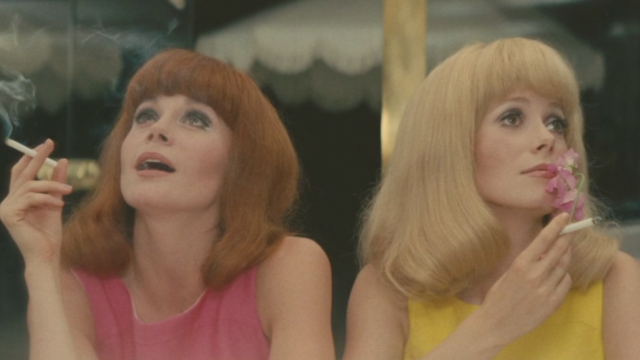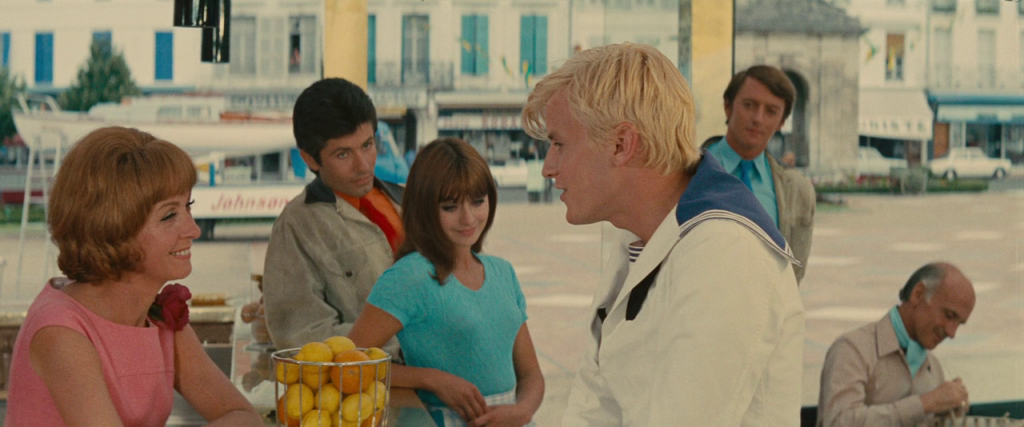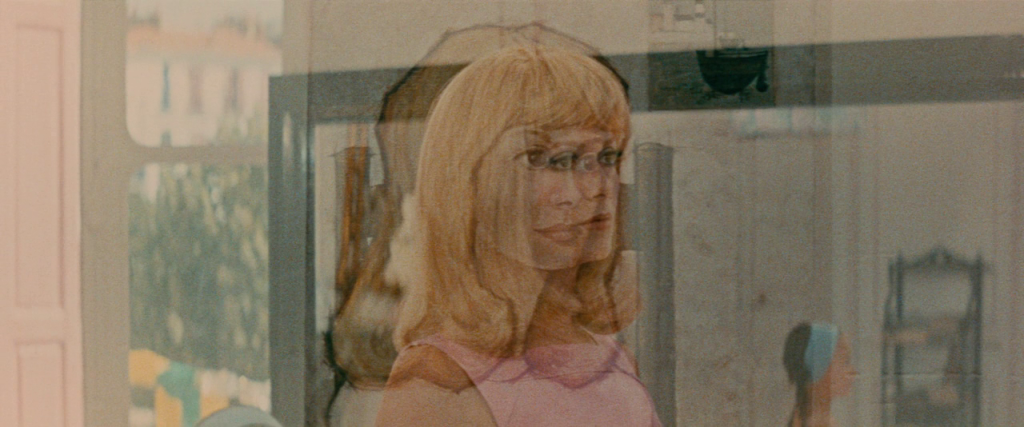If there’s such a thing as the ultimate movie musical, I know of no better candidate for the title than Jacques Demy’s cinematic cream cake The Young Girls of Rochefort. Made at the tail end of both the Golden Age of the Hollywood musical and the French New Wave, it married the Technicolor splendor of the former to the youthful energy and interest in real-world spaces of the latter, taking the most artificial of genres and making it feel at home in and around the quotidian without sacrificing any of its essential pleasures. Its magic lies in being not just a musical done right but one of the most fully musicalized of movies, one in which singing and dancing truly come as naturally to the characters as breathing.
Filmed entirely on location in the titular port town, the movie eases us into its world, opening on the arrival of a traveling fair led by two cheerful carnies and ladies’ men, Bill (Grover Dale) and Etienne (George Chakiris); underneath the opening credits, they get into town via a massive transporter bridge (the only one remaining in France), which indirectly emphasizes the specialness of the place. As they set up on the town’s square, a crane shot seamlessly takes us into an apartment/dance school belonging to twins Delphine and Solange (real-life sisters Catherine Deneuve and Françoise Dorléac), a pair of flibbertigibbets who both dream of finding a perfect man and going away to conquer Paris. Their single mother, Yvonne (Danielle Darrieux), operates a café on the square and still pines for a great love from a decade earlier, Simon (Michel Piccoli, as open and vulnerable here as he is slippery and menacing in the other 1967 classic he starred in with Deneuve), who, unbeknownst to her, has recently come back to Rochefort and opened a music shop ― but, for his part, mistakenly believes she’s not around.
One of Yvonne’s regulars, sailor and artist Maxence (Jacques Perrin), has painted a portrait of his “ideal woman” that happens to look exactly like Delphine; before long, she sees the painting in a local gallery and in turn becomes obsessed with its creator, but is kept from finding him by Guillaume (Jacques Ribesrolles), the gallery’s owner and her jealous lover, which creates another fated couple who remain unaware of their proximity. That unawareness is not an issue for Solange and Simon’s visiting American friend Andy Miller, who lock eyes on the street one day and immediately know ― except that she promptly runs off before learning anything about him because she’s so overwhelmed, a response that makes sense in light of the fact that he’s played by Gene Kelly.
Despite them being consecutive Deneuve-starring musicals, the Demy film The Young Girls of Rochefort most resembles is not his most celebrated work, The Umbrellas of Cherbourg, but his 1961 feature debut Lola, which introduced the director’s preoccupation with ― in roughly ascending order of importance ― sailors (dating surely back to On the Town, released when Demy was 18), friendships between earnest young men and matronly waitresses, old flames circling one another, chance encounters, and romantic obsession in all its forms. The key difference is that the Demy of Lola was a breathless explorer, plunging headlong into the world, risking losing himself in all it had to offer; the Demy of Young Girls is an orchestrator, using the world for the purposes of expression. The movie has a dozen major characters, half of whom are further divided into destined pairings, and it makes a playfully intricate spectacle out of these people’s run-ins, connections, misunderstandings and near-misses, finding ways to delay the ultimate gratification for as long as possible. In other words, it’s a movie that understands how (and why) people watch movies ― and specifically romances ― and it enters into a sophisticated game with its audience, knowing what we know (and expect), knowing it has to honor that unspoken agreement, letting us know that it knows and toying with us, yet never making light of itself or veering into outright self-awareness.
That sophistication further comes through in the film’s tone. The Young Girls of Rochefort has the appearance, disposition, and basic reputation of a lighthearted, joyous, exuberant work, the happiest of happy movies. And it is all those things ― a sincerely romantic fantasy set in a place that appears to be perpetually bathed in sunshine, filled with color and gorgeous people dancing in the streets to Michel Legrand’s eternally fresh-sounding score, believing in love and happiness enough to treat them with not only breathiness but also a droll matter-of-factness. (Prelude to one of the songs: “I just met the man of my dreams.” “Where?” “On the street.” “Spill it!”) A signature moment ― one of my favorites in the film ― follows the two-minute mark in the clip above, as construction guys who’d previously been paying no attention to the musical number taking place next to them casually join in when the dancers get close, as if pulled by gravity, then just as сasually get “released” and go back to work. (Meanwhile, at the 2:45 mark, Maxence and Yvonne can be seen chatting in the café at the left of the frame, a reminder of the closeness of all the goings-on that’s barely noticeable and all the lovelier for that reason.) Unlike Cherbourg, the film is not sung through, but it weaves singing and dancing into its fabric, repeatedly re-awakening the audience to the possibilities the genre offers. A break-up is a song; so are directions and a newspaper report. Exactly one song is sung directly to the viewer. A four-minute dialogue scene is offhandedly spoken in rhyme.
But the film’s nonstop delights would never be so treasurable if there weren’t something else in the air all the while, a faint but increasingly unmistakable melancholy. It is there in the fact that, for all their good cheer, the love these people sing about is a love they’ve either lost or never had. The younger characters are yearning and the older ones are regretful. They sing the same songs about one another without knowing it, the music binding them while they’re still alone. Their dancing is spirited and expressive but ― with the slight exception of Kelly’s number, which he choreographed himself ― uncomplicated and down-to-earth, a reminder that they are ordinary people. At times, the film draws a straight line from the silliness of youth to the pain of middle age, as in the revelation that Yvonne left Simon all those years ago because his last name is Dame, which unacceptably meant that marrying him would have made her Madame Dame. Maxence’s desire for a fixed image of a perfect woman ― one in whose search, he informs us, he’s “sailed the seven seas, from Venice to Java, from Manila to Angkor” ― is only romantic in a strictly movie-ish way and realistically hints at possessiveness and denial, a fact the film is perfectly aware of and opts to signal not by any conventional means but via a hilariously, pointedly jarring subplot about an ax murder.
The melancholy necessarily extends to the film’s structure, its setting, its fundamental nature. What gives life-changing chance encounters so much meaning is the understanding of how easily they might not have taken place, a sensation that’s only intensified in Young Girls by how openly it contrives to keep its soulmates apart. Its Rochefort is miraculous, hence closed-off, a timeless place in which our time is limited; just as the film begins with the visitors’ arrival, it ends with their departure, taking place over the course of a weekend and a Monday morning. The moments of joy that are found within that time ― an impromptu group song-and-dance, spontaneous connections, a dinner that brings most of the characters together, the only 70 seconds in cinematic history in which Gene Kelly and Catherine Deneuve ever shared the frame ― are so potent precisely because they’re so fleeting. It is The Young Girls of Rochefort’s understanding of this that marks it as both the most joyous and the most subtly bittersweet of movies, and it could never be one without also being the other.
And it’s a truly romantic film, too, because it arrives at its belief in things like love at first sight and last-minute happy endings through understanding that they are only possible in movies; it makes dreams come true on screen, yet it never stops yearning, never stops wondering if real life, too, can’t be like this. It creates a protective idyll for its characters ― and the audience ― and, far from imposing its preciousness on us, makes the pleasure of spending time in it inextricable from its fragility. And so when, in the climax, Delphine and Solange perform a buoyant number at the fair that implores the audience to “love your life, love the flowers, love to laugh, love to cry/love the day, love the night, love the sunshine and the showers,” it’s not an easy postcard sentiment. It is a conviction the movie carries with it in every frame.




